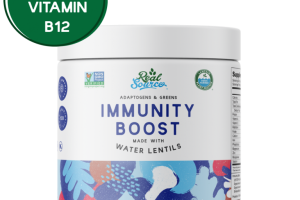Boost Your Immunity with These Targeted Supplement Recommendations

Understanding the Immune System
How the Immune System Works
The immune system is like the body’s own security team, constantly on patrol to detect and address threats. It comprises various cells, tissues, and organs that work together to defend against invaders such as viruses and bacteria. Here’s a simplified breakdown of its functionality:
- Boost Your Immunity with These Targeted Supplement Recommendations
- Understanding the Immune System
- How the Immune System Works
- Factors Affecting Immunity Levels
- Essential Vitamins for Immunity
- Vitamin C
- Vitamin D
- Minerals to Boost Immunity
- Zinc
- Selenium
- Herbal Supplements for Immune Support
- Echinacea
- Astragalus
- Prebiotics and Probiotics for Immune Health
- Prebiotics: Fueling the Good Bacteria
- Probiotics: Introducing Healthy Bacteria
- Antioxidants for a Strong Immune System
- Vitamin E
- Glutathione
- Lifestyle Changes to Strengthen Immunity
- Importance of Sleep
- Managing Stress Levels
- Exercise for Better Immune Function
- Impact of Physical Activity
- Best Exercises for Immunity Boost
- Consultation with a Healthcare Professional
- Seeking Professional Advice
- Importance of Individualized Recommendations
- White Blood Cells (Leukocytes): These are the frontline defenders. They recognize harmful intruders and initiate a response.
- Lymphatic System: This network of vessels and nodes transports immune cells throughout the body and helps in trapping pathogens.
- Antibodies: Produced by B cells, these proteins neutralize pathogens and mark them for destruction.
Just like a well-coordinated team, the immune response involves multiple players working together to ensure protection and recovery from illness.
Factors Affecting Immunity Levels
Immunity levels can fluctuate due to several factors, much like how a sports team’s performance can vary from season to season. Key influencers include:
- Nutrition: A balanced diet rich in vitamins and minerals supports immune function.
- Stress: Chronic stress can weaken response effectiveness.
- Sleep Quality: Adequate rest is crucial; sleep deprivation can lower defenses.
Understanding these factors is essential to maintaining a robust immune system. Think of it as a delicate balance, where lifestyle choices significantly impact overall health.
Essential Vitamins for Immunity
Vitamin C
Vitamin C is famous for its immune-boosting properties. It acts as a powerful antioxidant, helping to protect immune cells from damage. Along with that, it enhances the production of white blood cells, which are crucial for combating infections. Many people may recall sipping on orange juice when feeling under the weather—there’s a reason for that! Incorporate Vitamin C through:
- Citrus fruits: oranges, lemons, and grapefruits.
- Vegetables: bell peppers, broccoli, and spinach.
- Supplements: available if dietary intake is insufficient.
Adding these to your diet not only supports immunity but also contributes to overall health.
Vitamin D
Often referred to as the “sunshine vitamin,” Vitamin D plays a vital role in immune response regulation. It helps activate the T cells that are essential for defending against pathogens. Many have experienced a drop in Vitamin D levels during colder months, making supplementary sources vital. Key sources of Vitamin D include:
- Sunlight: just 15-30 minutes of sun exposure can boost levels.
- Food sources: fatty fish, fortified dairy products, and egg yolks.
- Supplements: helpful, particularly in winter months.
Ensuring adequate intake of these essential vitamins can significantly fortify the immune system, keeping it strong and ready to tackle potential threats.
Minerals to Boost Immunity
Zinc
Zinc is an essential mineral that plays a critical role in supporting the immune system. It aids in the development and function of immune cells, making it a powerhouse for your body’s defense. Many may not realize how vital it is until they experience a deficiency, which can lead to frequent illness. Incorporate zinc into your diet through:
- Shellfish: such as oysters, which are incredibly high in zinc.
- Meat: beef, chicken, and pork are excellent sources.
- Legumes: beans, lentils, and chickpeas for plant-based options.
A fun fact: when kids feel a cold coming on, parents often give them zinc lozenges, hoping to shorten the duration of the illness!
Selenium
Selenium, while less commonly discussed, is equally important for a robust immune system. It helps fight infections and supports antioxidant activity, keeping cells healthy. People often overlook selenium but realize its importance when they learn about its profound effects on the immune response. Sources of selenium include:
- Brazil nuts: a tiny handful can provide more than the daily requirement.
- Seafood: tuna, sardines, and shrimp are great choices.
- Whole grains: brown rice and barley!
Emphasizing these minerals in your diet can enhance your immune defenses, creating a stronger shield against illness.
Herbal Supplements for Immune Support
Echinacea
Echinacea is one of the most popular herbal supplements known for its immune-supporting properties. Often used at the first sign of a cold, many swear by its ability to reduce the duration and severity of symptoms. Personal stories abound about its effectiveness—friends sharing tales of warding off illness with a warm cup of echinacea tea. Benefits of Echinacea include:
- Stimulating white blood cell activity: enhancing the body’s natural defenses.
- Reducing inflammation: which can help alleviate symptoms.
- Available forms: teas, capsules, and tinctures provide flexibility in usage.
If you find yourself catching colds frequently, consider making Echinacea a part of your routine!
Astragalus
Another powerful herb, astragalus, has been used in traditional Chinese medicine for centuries. This adaptogen is believed to enhance the immune system and boost overall vitality. Some even describe it as a shield against seasonal ailments. Key points about astragalus:
- Supports immune function: by increasing the production of immune cells.
- Rich in antioxidants: helping to combat oxidative stress.
- Forms: comes in powders, capsules, and extracts for easy incorporation.
Adding herbal supplements like Echinacea and astragalus into your health regimen can offer a natural boost, helping you stay resilient against various health challenges.
Prebiotics and Probiotics for Immune Health
Prebiotics: Fueling the Good Bacteria
When discussing immune health, prebiotics often take the spotlight for their critical role in nurturing the beneficial bacteria in our gut. These dietary fibers act as food for good probiotics, ensuring they thrive and help maintain a balanced microbiome. You might not realize it, but having a healthy gut can greatly influence your immune system. Incorporate prebiotics into your diet through:
- Foods: bananas, garlic, onions, and asparagus.
- Whole grains: oats and barley are fantastic options.
- Legumes: beans and lentils also provide significant amounts.
Think of prebiotics as the nutrient-rich soil that helps your garden of healthy bacteria flourish.
Probiotics: Introducing Healthy Bacteria
On the flip side, probiotics are the live bacteria that you can introduce to your gut to bolster your immune defenses. Many people have found success in enhancing their health through the regular consumption of probiotics. A friend shared how adding yogurt to her daily breakfast transformed her digestive health and overall well-being. Sources of probiotics include:
- Fermented foods: yogurt, kefir, kimchi, and sauerkraut.
- Probiotic supplements: available in various forms to meet your nutritional needs.
By strategically incorporating both prebiotics and probiotics into your diet, you can create a powerful foundation for immune health. They work hand in hand to keep your gut thriving, which in turn strengthens your body’s defenses against illness.
Antioxidants for a Strong Immune System
Vitamin E
Vitamin E serves as a powerful antioxidant that helps combat oxidative stress in the body. This stress can weaken the immune system, making it vital to maintain adequate levels of Vitamin E for optimal health. Many people take it for granted, but it plays a significant role in protecting immune cells from damage. To boost your Vitamin E intake, consider including these foods:
- Nuts and seeds: almonds and hazelnuts are especially rich.
- Green leafy vegetables: spinach and broccoli are excellent sources.
- Fortified cereals: provide an easy way to incorporate this nutrient into your diet.
Personally, I’ve noticed a difference in my overall energy levels since I started snacking on nuts regularly!
Glutathione
Another remarkable antioxidant, glutathione, is often referred to as the “master antioxidant” due to its ability to neutralize free radicals and boost overall immunity. It is naturally produced in the body but can be depleted by factors such as stress and poor diets. You can enhance your glutathione levels by consuming:
- Cruciferous vegetables: like broccoli, Brussels sprouts, and cabbage.
- Garlic and onions: these contain sulfur, which is crucial for glutathione synthesis.
- Whey protein: rich in cysteine, an amino acid that promotes glutathione production.
Incorporating antioxidants like Vitamin E and glutathione into your lifestyle can significantly strengthen your immune system, setting the stage for better health and resilience against illness.
Lifestyle Changes to Strengthen Immunity
Importance of Sleep
Quality sleep is one of the cornerstones of a robust immune system. When we sleep, our body undergoes critical repair processes and strengthens its defenses against infections. It’s fascinating how just a lack of sleep can lead to a noticeable drop in immunity! I remember feeling sluggish and constantly catching colds during periods when I didn’t hit my sleep targets. To improve sleep quality and enhance your immunity:
- Establish a sleep schedule: aim for 7-9 hours each night, going to bed and waking up at the same time.
- Create a bedtime routine: winding down with a book or calming tea can promote relaxation.
- Limit blue light exposure: try to avoid screens at least an hour before bedtime.
Managing Stress Levels
Chronic stress is another enemy of the immune system, leading to inflammation and increased vulnerability to illnesses. Managing stress effectively can significantly improve overall health and bolster immunity. I’ve found that incorporating a few relaxation techniques into my day makes a world of difference in how I feel. Here are some effective stress management strategies:
- Mindfulness and meditation: a few minutes of mindfulness can improve mental clarity and calmness.
- Physical activity: exercising releases endorphins, which help reduce stress levels.
- Deep breathing exercises: practicing deep breathing can quickly lower feelings of stress and anxiety.
By prioritizing sleep and managing stress effectively, individuals can enhance their immune response and safeguard their health against various ailments. Making these lifestyle changes could be the key to feeling more vibrant and resilient!
Exercise for Better Immune Function
Impact of Physical Activity
Physical activity has a profound impact on immune function, acting as a natural enhancer for the body’s defenses. Regular exercise promotes healthy circulation, enabling immune cells to move efficiently throughout the body. Personally, I’ve noticed that my body feels much more resilient on days when I make time for a workout. It’s like giving my immune system a little boost! Some key benefits of physical activity for immunity include:
- Reduced inflammation: Regular exercise can help lower inflammatory markers in the body.
- Improved mood: Exercise promotes endorphin release, which can help combat stress, a known culprit in weakening immunity.
- Enhanced sleep quality: Better sleep leads to improved immune responses, creating a positive feedback loop.
Best Exercises for Immunity Boost
When it comes to strengthening immunity, not all exercises are created equal. While any physical activity is beneficial, certain exercises can be especially effective:
- Aerobic exercise: Activities like walking, jogging, and cycling can elevate heart rate and improve lung capacity.
- Strength training: Lifting weights helps build muscle, which supports overall metabolic health.
- Yoga or tai chi: These minimize stress and promote flexibility, grounding you mentally and physically.
Incorporating a mix of these exercises into a weekly routine can help promote a stronger immune system, leaving you feeling energized and ready to tackle life’s challenges. Embracing an active lifestyle is not just about fitness—it’s a vital component of holistic health!
Consultation with a Healthcare Professional
Seeking Professional Advice
When it comes to strengthening your immune system, consulting with a healthcare professional can be invaluable. Doctors, nutritionists, and dietitians have the expertise to provide tailored advice based on your individual health needs. Personally, I found it enlightening to sit down with a nutritionist to discuss my dietary habits; they offered insights I hadn’t considered before. Here’s why seeking professional advice is crucial:
- Proper diagnosis: A professional can assess any underlying conditions affecting your immunity.
- Customized plans: They can develop a personalized nutrition and exercise plan that aligns with your lifestyle.
- Safe supplementation: Understanding which vitamins and supplements are right for you is vital, as some can interact with medications.
Importance of Individualized Recommendations
No two bodies are alike, and neither are their immune systems. Individualized health recommendations take into account your unique genetics, lifestyle, and existing health conditions. This personalized approach can lead to better outcomes and a more effective boost to your immune function. Consider these factors for personalized advice:
- Age and sex: Nutritional needs can differ based on these demographics.
- Medical history: Pre-existing conditions may require special dietary considerations.
- Lifestyle factors: Activity levels and daily routines play a significant role in what’s best for your body.
Overall, consulting with a healthcare professional is a proactive step toward optimizing your immune health, ensuring you get the most effective and safe recommendations for your unique situation.





